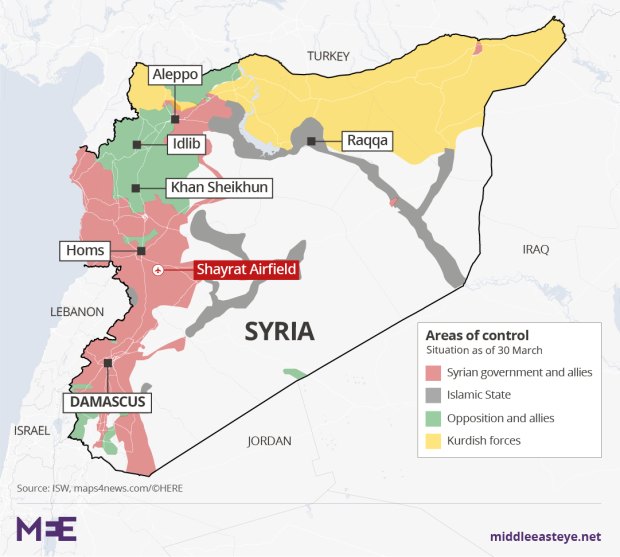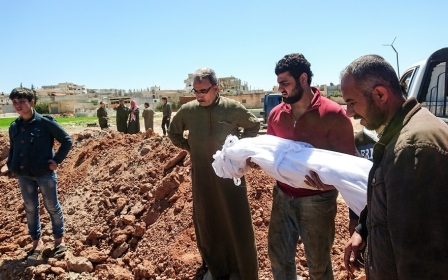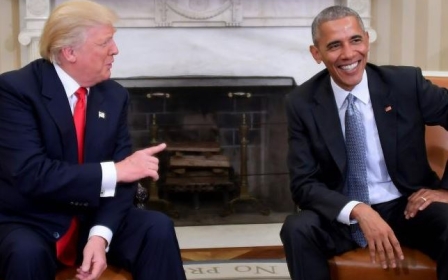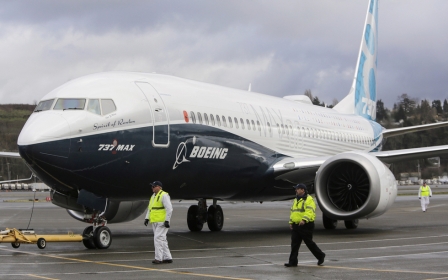White House: 59 precision-guided missiles hit Syrian airfield
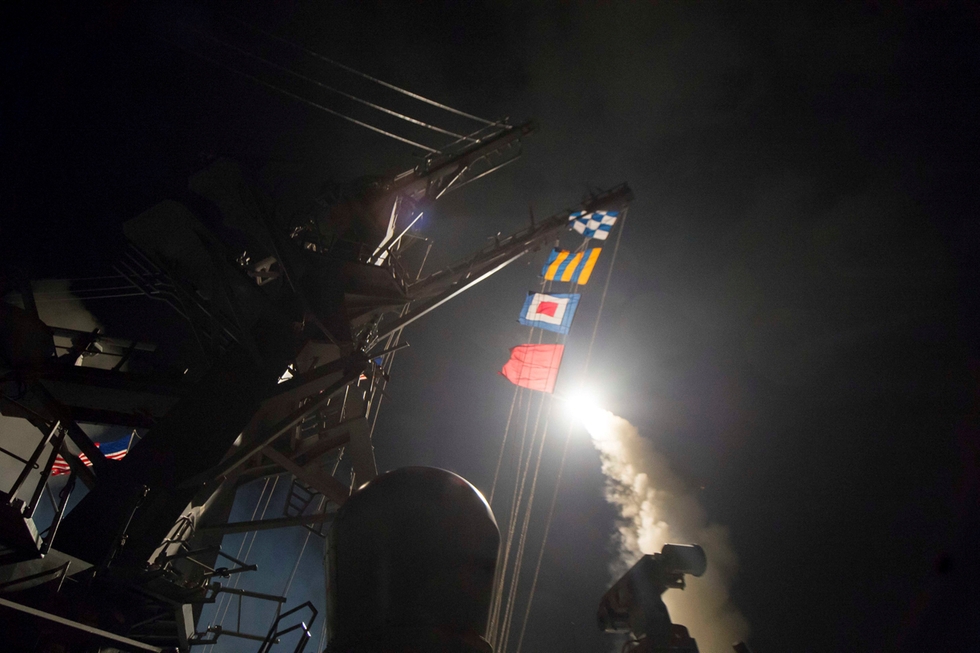
US President Donald Trump ordered a massive military strike against Syria in retaliation for a chemical attack with a sarin-like nerve agent that Washington blames on President Bashar al-Assad.
Russia said the attack would damage relations between Moscow and Washington.
A White House official said that on Friday morning local time, 59 precision-guided missiles hit Shayrat Airfield in Syria, from which the United States says Tuesday's deadly attack was launched. US officials said Syria's ally Russia was warned before the strike, though it was not asked for approval.
The Tomahawk cruise missiles were launched from two destroyers, the USS Porter and the USS Ross, which belong to the US Navy's Sixth Fleet and are located in the eastern Mediterranean. A US official said the missiles targeted aircraft and runways at the base.
"This site was associated with the Syrian regime's chemical weapons program and directly linked to the horrific chemical weapons attack April 4th," the White House official said.
"We assess with a high degree of confidence that the chemical weapons attack earlier this week was launched from this site by air assets under the command of the Assad regime," the official added."We also assess, with a similar degree of confidence, that the Assad regime used a chemical nerve agent consistent with sarin in these attacks."
US officials said they informed Russian forces ahead of the missile attacks and that they took pains to avoid hitting Russian troops at the base, saying there were no strikes on sections of the base where Russians were present. But they said the administration did not seek Moscow's approval.
The Syrian Observatory for Human Rights, a Britain-based organisation that reports on the war, said four Syrian soldiers were killed, including a senior officer. It was citing its own sources.
The Syrian army said six people had been killed, and "extensive damage" caused. It would continue to "crush terrorism," the statement added.
Syria's information minister said the US strike was "limited" and he did not expect any further military escalation.
"I believe this strike was limited in time and space, and it was expected," Ramez Turjman said in a phone interview with Syrian state television.
Asked whether there would be a Russian response, Turjman said Moscow was making statements to condemn the US attack. "I don't expect there will be any military escalation," he said.
The Kremlin condemned the US attack, calling it “aggression against a sovereign state”. Iran also denounced the strikes.
Russian President Vladimir Putin said the missile strikes have seriously hurt US-Russia relations, news agencies cited the Kremlin as saying on Friday.
Putin's spokesman Dmitry Peskov was cited as saying that the Russian leader regarded the US action as a cynical attempt to distract the world from civilian deaths in Iraq.
Peskov was also quoted as saying that Russia did not believe that Syria possessed chemical weapons and that the US move would inevitably create a serious obstacle to creating an international coalition to fight terrorism, an idea that Putin has repeatedly pushed.
Trump, speaking on TV from his Florida resort, Mar-a-Lago, where he was attending a summit with Chinese President Xi Jinping, said: "Tonight I ordered a targeted military strike on the airfield in Syria from where the chemical attack was launched.
"It is in the vital national security interest of the United States to prevent and deter the spread and use of deadly chemical weapons," Trump said.
"There can be no dispute that Syria used banned chemical weapons, violated its obligations under the chemical weapons convention and ignored the urging of the UN Security Council," he added.
'End this slaughter,' Trump says
Trump ordered the strikes just a day after he pointed the finger at Assad for this week's chemical attack, which killed at least 70 people, many of them children, in the Syrian town of Khan Sheikhoun. The Syrian government has denied it was behind the attack.
Trump appeared to have opted for measured and targeted air attacks instead of a full-blown assault on Assad's forces and installations.
The relatively quick response to the chemical attack came as Trump faced a growing list of global problems, from North Korea to China to Iran and the Islamic State group, and may have been intended to send a message to friends and foes alike of his resolve to use military force if deemed necessary.
"Tonight I call on all civilised nations to join us in seeking to end this slaughter and bloodshed in Syria and also to end terrorism of all kinds and all types," Trump said.
Speaking earlier, US Secretary of State Rex Tillerson said there may be no future for Assad as Syria's leader.
“Assad's role in the future is uncertain, clearly, and with the acts that he has taken it would seem that there would be no role for him to govern the Syrian people,” he said.
A US official said the missile launch was a was a "one-off," meaning that it was expected to be a single strike with no current plans for escalation.
The official, who spoke on condition of anonymity, told Reuters he believed that the strike did not signal a major shift in Trump's focus on domestic affairs.
Pentagon spokesman Jeff Davis said Russian forces were informed of the strikes in advance. “US military planners took precautions to minimise risk to Russian or Syrian personnel located at the airfield,” he said in a statement.
Davis, briefing reporters on the operation, said the US military had multiple conversations with Russian forces on Thursday before the strike, using a line of communication that had previously been established to prevent an accidental clash in Syria during the fight against the Islamic State group.
Davis added that the missile launch was a proportionate response to the chemical attack.
The strike targeted “aircraft, hardened aircraft shelters, petroleum and logistical storage, ammunition supply bunkers, air defence systems, and radars,” Davis said.
'Syrian policy will not change'
The Syrian National Coalition, the main political opposition alliance, said it hopes that US strikes will continue in order to stop government air strikes and the use of internationally banned weapons.
Islamist rebel group Ahrar al-Sham welcomed the strike, telling NBC that it supports “intervention through surgical strikes that would deter the Assad regime capabilities to kill civilians and shorten the suffering of our people.”
The governor of Syria's Homs province, however, said on Friday that US missile strikes on Syrian military positions serve the goals of "armed terrorist groups" including the Islamic State group.
"Syrian leadership and Syrian policy will not change," governor Talal Barazi said in a telephone interview with state television. "This targeting was not the first and I don't believe it will be the last."
The US military action put the new president at odds with Russia, which has air and ground forces in Syria after intervening there on Assad's side in 2015 and turning the tide against mostly Sunni Muslim rebel groups.
Trump has until now focused his Syria policy almost exclusively on defeating Islamic State group militants in northern Syria, where US special forces are supporting Arab and Kurdish armed groups.
The risks have grown worse since 2013, when Barack Obama, Trump's predecessor, considered and then rejected ordering a cruise missile strike in response to the use of chemical weapons by Assad's loyalists.
Only last week, US Ambassador to the United Nations Nikki Haley said the US diplomatic policy on Syria for now was no longer focused on making Assad leave power, one of Obama's aims.
But Trump said on Wednesday the gas attack in Idlib province, which sparked outrage around the world, had caused him to think again about Assad.
Sarin gas, inhaled or absorbed through the skin, kills by crippling the respiratory centre of the central nervous system and paralyses the muscles around the lungs.
Sarin was used by Iraqi dictator Saddam Hussein to gas thousands of Kurds in the northern town of Halabja in 1988.
New MEE newsletter: Jerusalem Dispatch
Sign up to get the latest insights and analysis on Israel-Palestine, alongside Turkey Unpacked and other MEE newsletters
Middle East Eye delivers independent and unrivalled coverage and analysis of the Middle East, North Africa and beyond. To learn more about republishing this content and the associated fees, please fill out this form. More about MEE can be found here.


